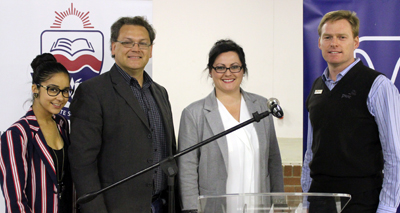 |
From the left: Lauren Marais, Werner Landman, Herloise Jordaan and Louis Rossouw (PwC).
13 September 2013 |
The Alumni Office at the University of the Free State (UFS), in partnership with PricewaterhouseCoopers (PwC), held its first Alumni Evening for final-year students.
The students received valuable advice from various speakers during the event. Werner Landman – also a UFS graduate – highlighted the differences in approach between the current and previous generations. Landman explained that Generation Y students have greater influence and are extensively connected socially as they enter the work environment. “You are people who will work to live, unlike us, Generation X, who live to work,” he said. With their degrees – some already busy with their post-graduate studies – they are more likely to be appointed in professions which will allow them to live better, he added.
Heloise Jordaan, former 2008/9 SRC president, who holds three degrees from Kovsies to her name, also addressed the final-years. She currently holds the position of brand manager at Urban Hotels, although she only started working recently. Through sharing her personal work experiences, she gave the audience a glimpse into the workplace."You guys need to realise that when you step into the working sphere, you need to be open minded and also work to the best of your abilities,” Jordaan encouraged.
The evening was concluded on a high note with a prize-giving. Pieter du Toit, UFS Alumni Chair, was in charge of handing over the awards. Residences were compared to find which ones generated the most residing final-year and postgraduate students. House Tswelopele and Soetdoring clinched the honours and walked away with R2 000 each for their house.